Done做状语练习-答案
- 格式:doc
- 大小:17.00 KB
- 文档页数:1
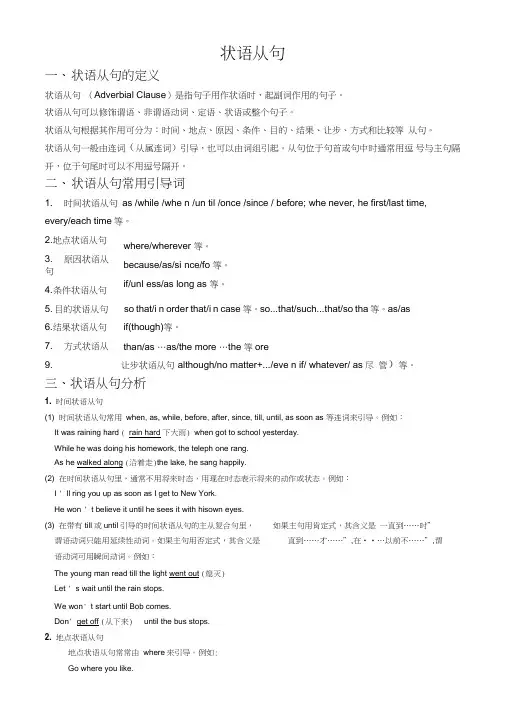
状语从句一、状语从句的定义状语从句(Adverbial Clause)是指句子用作状语时,起副词作用的句子。
状语从句可以修饰谓语、非谓语动词、定语、状语或整个句子。
状语从句根据其作用可分为:时间、地点、原因、条件、目的、结果、让步、方式和比较等从句。
状语从句一般由连词(从属连词)引导,也可以由词组引起。
从句位于句首或句中时通常用逗号与主句隔开,位于句尾时可以不用逗号隔开。
二、状语从句常用引导词1. 时间状语从句as /while /whe n /un til /once /since / before; whe never, he first/last time,every/each time等。
2. 地点状语从句3. 原因状语从句4. 条件状语从句5. 目的状语从句6. 结果状语从句7. 方式状语从句where/wherever 等。
because/as/si nce/fo 等。
if/unl ess/as long as 等。
so that/i n order that/i n case等。
so...that/such...that/so tha等。
as/as if(though)等。
than/as …as/the more …the 等ore9. 让步状语从句although/no matter+.../eve n if/ whatever/ as尽管)等。
三、状语从句分析1. 时间状语从句(1) 时间状语从句常用when, as, while, before, after, since, till, until, as soon as 等连词来引导。
例如:It was raining hard ( rain hard 下大雨) when got to school yesterday.While he was doing his homework, the teleph one rang.As he walked along (沿着走)the lake, he sang happily.(2) 在时间状语从句里,通常不用将来时态,用现在时态表示将来的动作或状态。

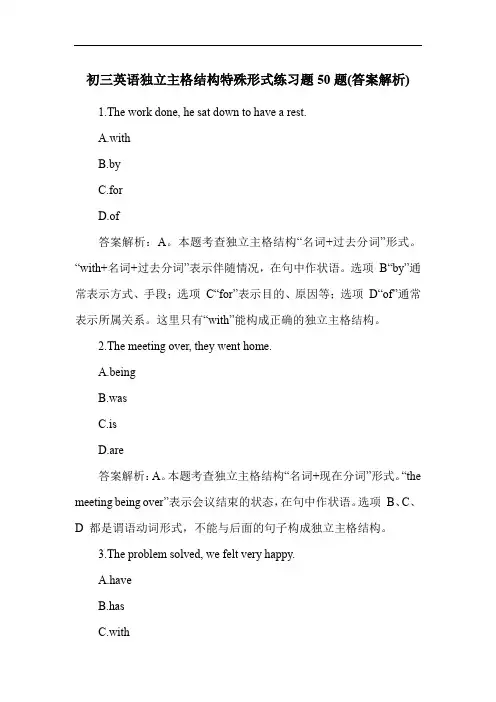
初三英语独立主格结构特殊形式练习题50题(答案解析)1.The work done, he sat down to have a rest.A.withB.byC.forD.of答案解析:A。
本题考查独立主格结构“名词+过去分词”形式。
“with+名词+过去分词”表示伴随情况,在句中作状语。
选项B“by”通常表示方式、手段;选项C“for”表示目的、原因等;选项D“of”通常表示所属关系。
这里只有“with”能构成正确的独立主格结构。
2.The meeting over, they went home.A.beingB.wasC.isD.are答案解析:A。
本题考查独立主格结构“名词+现在分词”形式。
“the meeting being over”表示会议结束的状态,在句中作状语。
选项B、C、D 都是谓语动词形式,不能与后面的句子构成独立主格结构。
3.The problem solved, we felt very happy.A.haveB.hasC.withD.by答案解析:C。
本题考查独立主格结构“with+名词+过去分词”形式。
“with the problem solved”表示问题被解决的状态,在句中作状语。
选项A、B 都是谓语动词形式;选项D“by”通常表示方式、手段,这里用“with”更合适。
4.The sun shining brightly, we went for a walk.A.shoneB.shiningC.to shineD.shine答案解析:B。
本题考查独立主格结构“名词+现在分词”形式。
“the sun shining brightly”表示太阳明亮地照耀着的状态,在句中作状语。
选项 A 是过去式;选项C 是不定式;选项D 是动词原形,都不能构成正确的独立主格结构。
5.The rain falling heavily, we stayed at home.A.fallB.fallingC.fellD.fallen答案解析:B。
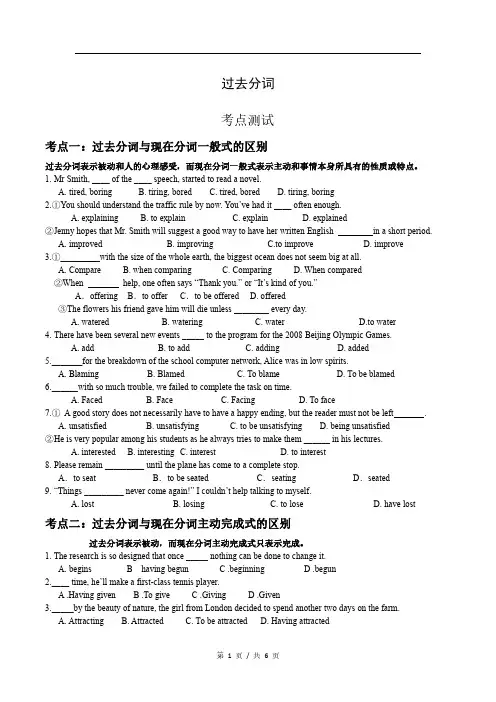
过去分词考点测试考点一:过去分词与现在分词一般式的区别过去分词表示被动和人的心理感受,而现在分词一般式表示主动和事情本身所具有的性质或特点。
1.Mr Smith,____of the____speech,started to read a novel.A.tired,boringB.tiring,boredC.tired,boredD.tiring,boring2.①You should understand the traffic rule by now.You’ve had it____often enough.A.explainingB.to explainC.explainD.explained②Jenny hopes that Mr.Smith will suggest a good way to have her written English in a short period.A.improvedB.improvingC.to improveD.improve3.①_____with the size of the whole earth,the biggest ocean does not seem big at all.pareB.when comparingparingD.When compared②When help,one often says“Thank you.”or“It’s kind of you.”A.offering B.to offer C.to be offered D.offered③The flowers his friend gave him will die unless________every day.A.wateredB.wateringC.waterD.to water4.There have been several new events_____to the program for the2008Beijing Olympic Games.A.addB.to addC.addingD.added5._______for the breakdown of the school computer network,Alice was in low spirits.A.BlamingB.BlamedC.To blameD.To be blamed6.______with so much trouble,we failed to complete the task on time.A.FacedB.FaceC.FacingD.To face7.①A good story does not necessarily have to have a happy ending,but the reader must not be left.A.unsatisfiedB.unsatisfyingC.to be unsatisfyingD.being unsatisfied②He is very popular among his students as he always tries to make them______in his lectures.A.interestedB.interestingC.interestD.to interest8.Please remain_________until the plane has come to a complete stop.A.to seat B.to be seated C.seating D.seated9.“Things_________never come again!”I couldn’t help talking to myself.A.lostB.losingC.to loseD.have lost考点二:过去分词与现在分词主动完成式的区别过去分词表示被动,而现在分词主动完成式只表示完成。
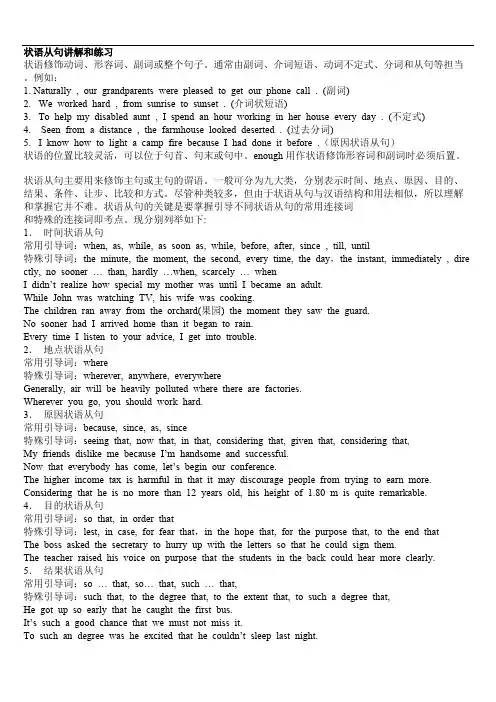
状语从句讲解和练习状语修饰动词、形容词、副词或整个句子。
通常由副词、介词短语、动词不定式、分词和从句等担当。
例如:1. Naturally , our grandparents were pleased to get our phone call . (副词)2. We worked hard , from sunrise to sunset . (介词状短语)3. To help my disabled aunt , I spend an hour working in her house every day . (不定式)4. Seen from a distance , the farmhouse looked deserted . (过去分词)5. I know how to light a camp fire because I had done it before .(原因状语从句)状语的位置比较灵活,可以位于句首、句末或句中。
enough用作状语修饰形容词和副词时必须后置。
状语从句主要用来修饰主句或主句的谓语。
一般可分为九大类,分别表示时间、地点、原因、目的、结果、条件、让步、比较和方式。
尽管种类较多,但由于状语从句与汉语结构和用法相似,所以理解和掌握它并不难。
状语从句的关键是要掌握引导不同状语从句的常用连接词和特殊的连接词即考点。
现分别列举如下:1.时间状语从句常用引导词:when, as, while, as soon as, while, before, after, since , till, until特殊引导词:the minute, the moment, the second, every time, the day,the instant, immediately , dire ctly, no sooner … than, hardly …when, scarcely … whenI didn’t realize how special my mother was until I became an adult.While John was watching TV, his wife was cooking.The children ran away from the orchard(果园) the moment they saw the guard.No sooner had I arrived home than it began to rain.Every time I listen to your advice, I get into trouble.2.地点状语从句常用引导词:where特殊引导词:wherever, anywhere, everywhereGenerally, air will be heavily polluted where there are factories.Wherever you go, you should work hard.3.原因状语从句常用引导词:because, since, as, since特殊引导词:seeing that, now that, in that, considering that, given that, considering that,My friends dislike me because I’m handsome and successful.Now that everybody has come, let’s begin our conference.The higher income tax is harmful in that it may discourage people from trying to earn more. Considering that he is no more than 12 years old, his height of 1.80 m is quite remarkable.4.目的状语从句常用引导词:so that, in order that特殊引导词:lest, in case, for fear that,in the hope that, for the purpose that, to the end thatThe boss asked the secretary to hurry up with the letters so that he could sign them.The teacher raised his voice on purpose that the students in the back could hear more clearly.5.结果状语从句常用引导词:so … that, so… that, such … that,特殊引导词:such that, to the degree that, to the extent that, to such a degree that,He got up so early that he caught the first bus.It’s such a good chance that we must not miss it.To such an degree was he excited that he couldn’t sleep last night.6.条件状语从句常用引导词:if, unless,特殊引导词:as/so long as, only if, providing/provided that, suppose that, in case that, on condition th atWe’ll start our project if the president agrees.You will certainly succeed so long as you keep on trying.Provided that there is no opposition, we shall hold the meeting here.7.让步状语从句常用引导词:though, although, even if, even though特殊引导词:as(用在让步状语从句中必须要倒装),while ( 一般用在句首),no matter …,in spite of the fact that, while, whatever, whoever, wherever, whenever, however, whicheverMuch as I respect him, I can’t agree to his proposal.尽管我很尊敬他,我却不同意他的建议。
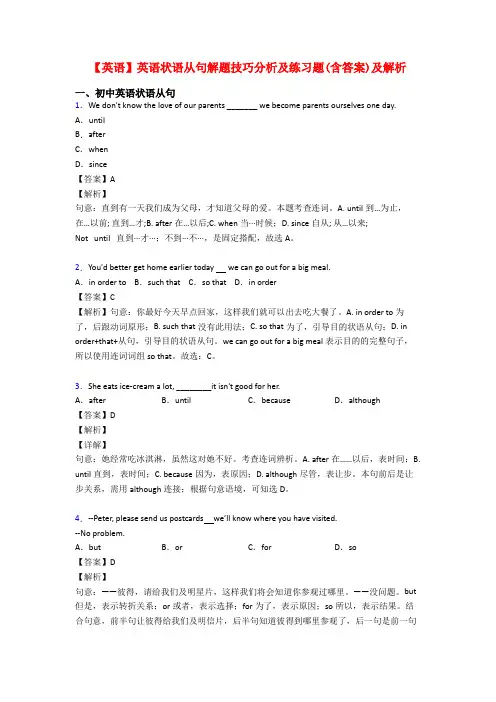
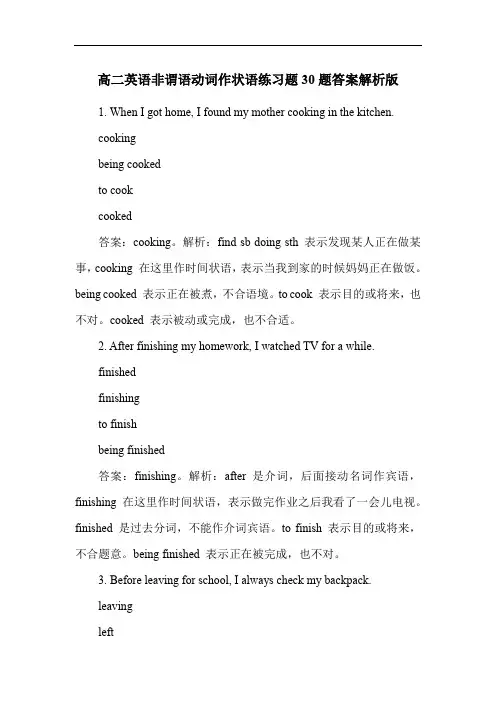
高二英语非谓语动词作状语练习题30题答案解析版1. When I got home, I found my mother cooking in the kitchen.cookingbeing cookedto cookcooked答案:cooking。
解析:find sb doing sth 表示发现某人正在做某事,cooking 在这里作时间状语,表示当我到家的时候妈妈正在做饭。
being cooked 表示正在被煮,不合语境。
to cook 表示目的或将来,也不对。
cooked 表示被动或完成,也不合适。
2. After finishing my homework, I watched TV for a while.finishedfinishingto finishbeing finished答案:finishing。
解析:after 是介词,后面接动名词作宾语,finishing 在这里作时间状语,表示做完作业之后我看了一会儿电视。
finished 是过去分词,不能作介词宾语。
to finish 表示目的或将来,不合题意。
being finished 表示正在被完成,也不对。
3. Before leaving for school, I always check my backpack.leavingleftto leavebeing left答案:leaving。
解析:before 是介词,后面接动名词作宾语,leaving 在这里作时间状语,表示在去学校之前我总是检查我的背包。
left 是过去分词,不能作介词宾语。
to leave 表示目的或将来,不合题意。
being left 表示正在被留下,也不对。
4. While waiting for the bus, I read a book.waitingwaitedto waitbeing waited答案:waiting。
解析:while 后面接现在分词作时间状语,表示在等公交车的时候我读了一本书。
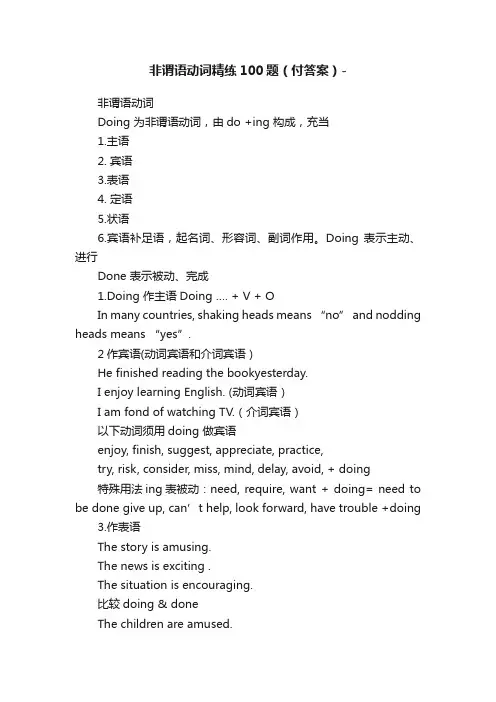
非谓语动词精练100题(付答案)-非谓语动词Doing 为非谓语动词,由do +ing 构成,充当1.主语2. 宾语3.表语4. 定语5.状语6.宾语补足语,起名词、形容词、副词作用。
Doing 表示主动、进行Done 表示被动、完成1.Doing 作主语Doing …. + V + OIn many countries, shaking heads means “no” and nodding heads means “yes”.2作宾语(动词宾语和介词宾语)He finished reading the bookyesterday.I enjoy learning English. (动词宾语)I am fond of watching TV.(介词宾语)以下动词须用doing 做宾语enjoy, finish, suggest, appreciate, practice,try, risk, consider, miss, mind, delay, avoid, + doing特殊用法ing表被动:need, require, want + doing= need to be done give up, can’t help, look forward, have trouble +doing3.作表语The story is amusing.The news is exciting .The situation is encouraging.比较doing & doneThe children are amused.People are excited by the news。
The boy is encouraged by the words.4.作定语a. the laughing audience / an amusing storyThe amusing play = the play that is amusing.The girl singing on the stage = The girl whois singing on the stage.a flying kite - a kite which is flying 放飞的风筝the rising sun –the sun that is rising 在升起的太阳the dancing girl - the girl who is dancing 在跳舞女孩the coming week –the week that is coming 下周注:doing sth 作定语相当于定语从句,表主动进行。
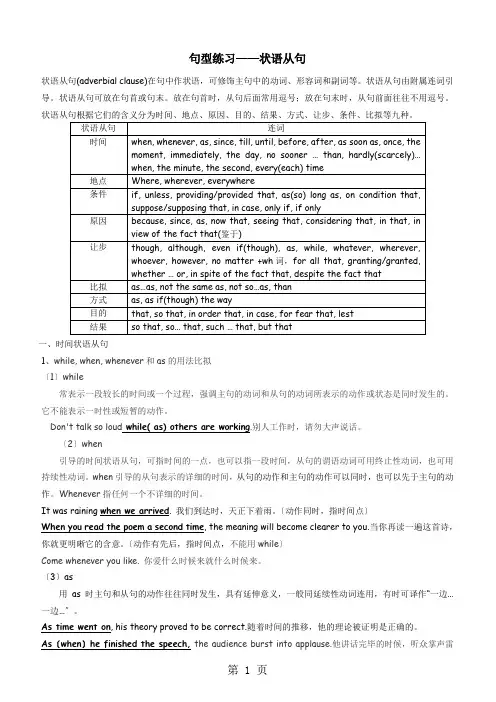
句型练习——状语从句状语从句(adverbial clause)在句中作状语,可修饰主句中的动词、形容词和副词等。
状语从句由附属连词引导。
状语从句可放在句首或句末。
放在句首时,从句后面常用逗号;放在句末时,从句前面往往不用逗号。
一、时间状语从句1、while, when, whenever和as的用法比拟〔1〕while常表示一段较长的时间或一个过程,强调主句的动词和从句的动词所表示的动作或状态是同时发生的。
它不能表示一时性或短暂的动作。
Don't talk so loud while( as) others are working.别人工作时,请勿大声说话。
〔2〕when引导的时间状语从句,可指时间的一点,也可以指一段时间,从句的谓语动词可用终止性动词,也可用持续性动词。
when引导的从句表示的详细的时间,从句的动作和主句的动作可以同时,也可以先于主句的动作。
Whenever指任何一个不详细的时间。
It was raining when we arrived. 我们到达时,天正下着雨。
〔动作同时,指时间点〕When you read the poem a second time, the meaning will become clearer to you.当你再读一遍这首诗,你就更明晰它的含意。
〔动作有先后,指时间点,不能用while〕Come whenever you like. 你爱什么时候来就什么时候来。
〔3〕as用as时主句和从句的动作往往同时发生,具有延伸意义,一般同延续性动词连用,有时可译作“一边…一边…〞。
As time went on, his theory proved to be correct.随着时间的推移,他的理论被证明是正确的。
As〔when〕he finished the speech, the audience burst into applause.他讲话完毕的时候,听众掌声雷动。
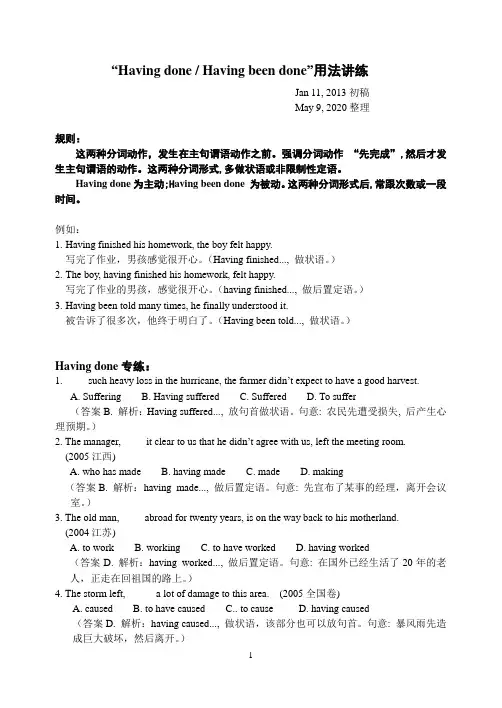
“Having done / Having been done”用法讲练Jan 11, 2013初稿May 9, 2020整理规则:这两种分词动作,发生在主句谓语动作之前。
强调分词动作“先完成”,然后才发生主句谓语的动作。
这两种分词形式,多做状语或非限制性定语。
Having done为主动;H aving been done为被动。
这两种分词形式后,常跟次数或一段时间。
例如:1.Having finished his homework, the boy felt happy.写完了作业,男孩感觉很开心。
(Having finished..., 做状语。
)2.The boy, having finished his homework, felt happy.写完了作业的男孩,感觉很开心。
(having finished..., 做后置定语。
)3.Having been told many times, he finally understood it.被告诉了很多次,他终于明白了。
(Having been told..., 做状语。
)Having done专练:1. ____ such heavy loss in the hurricane, the farmer didn’t expect to have a good harvest.A. SufferingB. Having sufferedC. SufferedD. To suffer(答案B. 解析:Having suffered..., 放句首做状语。
句意: 农民先遭受损失, 后产生心理预期。
)2. The manager, ____ it clear to us that he didn’t agree with us, left the meeting room. (2005江西)A.who has madeB. having madeC. madeD. making(答案B. 解析:having made..., 做后置定语。
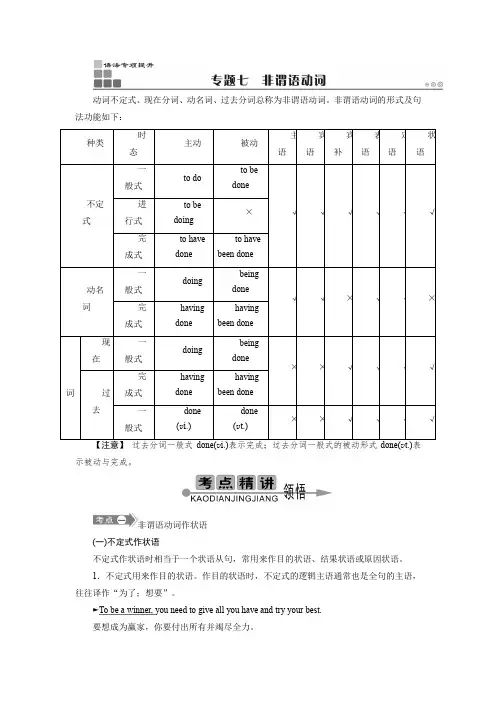
动词不定式、现在分词、动名词、过去分词总称为非谓语动词。
非谓语动词的形式及句法功能如下:示被动与完成。
非谓语动词作状语(一)不定式作状语不定式作状语时相当于一个状语从句,常用来作目的状语、结果状语或原因状语。
1.不定式用来作目的状语。
作目的状语时,不定式的逻辑主语通常也是全句的主语,往往译作“为了;想要”。
►To be a winner, you need to give all you have and try your best.要想成为赢家,你要付出所有并竭尽全力。
2.不定式用于so...as to, such...as to, enough to, too...to, only to等结构中作结果状语。
►Would you be so kind as to lend me your bicycle?你能好心把你的自行车借给我吗?►He hurried to the booking office only to be told all the tickets had been sold out.他匆忙去了售票处,结果被告知所有的票都已经卖完了。
【注意】“only+to do”表示出乎意料的结果,tell和主语he 之间存在动宾关系,因而应用不定式的被动结构。
而现在分词作结果状语则表示自然而然的结果。
►His parents died, leaving him an orphan.他的父母去世了,因此他成了孤儿。
(二)过去分词作状语1.过去分词所表示的动作与句子主语之间构成逻辑上的被动关系,且含有完成之意。
意义上相当于状语从句,表示时间、原因、条件、伴随状况等。
►Offered an important role in a new movie, Andy has got a chance to become famous.因为安迪在一部新电影中被分得一个重要角色,他得到了一个成名的机会。
2.某些动词的过去分词已经形容词化,且往往用于一些系表结构中。
2020年高考英语专题复习:情态动词+have done和动词的-ing形式作状语同步测试1. I________ through that bitter period without your generous help.A. couldn’t have goneB. didn’t goC. wouldn’t goD. hadn’t gone2. —I left my handbag on the train, but luckily someone gave it to a railway official.—How unbelievable to get it back! I mean, someone ______ it.A. will have stolenB. might have stolenC. should have stolenD. must have stolen3. They have arrived at lunchtime but their flight was delayed.A. willB. canC. mustD. should4. I ________ sooner but I didn’t know that they were waiting for me.A. had comeB. was comingC. would comeD. would have come5. —Sorry, Professor Smith. I didn’t finish the assignment yesterday.—Oh, you____ have done it as yesterday was the deadline.A. mustB. mustn’tC. shouldD. shouldn’t6. My five-year-old boy left home three days ago. An idea that something _____to him has been worrying me a lot.A. can have happenedB. should have happenedC. must happenD. must have happened7. —You missed a good chance.—Yes. I______ that job when it______.A. should have taken, was offeredB. should take, offeredC. hadn’t taken, was offeredD. might have taken, was offering8.—Must I take a bus to your home?—No, you_______. It’s just about 5 minutes’ walk from here.A. must notB. don’t have toC. shouldn’tD. don’t need9. The big fire last night_______ the whole building. But the heavy rain helped it.A. might be burning downB. could have burned downC. should have been burned downD. must have been burned down10. There was plenty of time. She_______.A. mustn’t have hurriedB. couldn’t have hurriedC. must not hurryD. needn’t have hurried11. —Guess what? I got an A in the exam.—Congratulations! Well, you ____.A. must have worked hardB. can work hardC. could have worked hardD. should work hard12. —What does the sign over there read?—No person ______smoke or carry a lighted cigarette, cigar or pipe in this area.A. willB. mayC. shallD. must13. Sorry, I’m late. I ____ have misunderstood the plan and I went for another appointment.A. mightB. shouldC. canD. will14. —I’m sorry. I ______ at you the other day.—Forget it. I was a bit out of control myself.A. shouldn’t shoutB. shouldn’t have shoutedC. mustn’t shoutD. mustn’t have shouted15. —Who told you my address?—I don’t remember clearly. It ______ Li Mei.—It ________ Li Mei. She doesn’t know it.A. can be; mustn’t beB. may have been; must have beenC. may have been; can’t beD. might have been; can’t have been情态动词+have done和动词的-ing形式作状语动词的-ing形式作状语1. In April, President Hu inspected the warships in Qingdao, the 60th anniversary of the founding of the PLA Navy.A. markingB. markedC. having markedD. being marked2. ______ in the queue for half an hour, the old man suddenly realized he had left the cheque in the car.A. WaitingB. To waitC. Having WaitedD. To have waited3. to reach them on the phone, we sent an email insteadA. FailB. FailedC. To failD. Having failed4. _____ their hats into the air, the fans of the winning team let out loud shouts of victory.A. To throwB. ThrownC. ThrowingD. Being thrown5. We had an anxious couple of weeks, _____ for the results of the experiment.A. waitB. to be waitingC. waitedD. waiting6. Lucy’s new job paid twice as much as she had made, ______ in the restaurant.A. workingB. workC. to workD. worked7. He was busy writing a story, only ______ once i n a while to smoke a cigarette.A. to stopB. stoppingC. to have sloppedD. having stopped8. ___ that she was going off to sleep, I asked if she’d like that little doll on her bed.A. SeeingB. To seeC. SeeD. Seen9. ______ in the fields on a March afternoon, he could feel the warmth of spring.A. To walk.B. WalkingC. WalkedD. Having walked10. My sister, an inexperienced rider, was found sitting on the bicycle _____ to balance it.A. having triedB. tryingC. to tryD. tried11. Those governments agreed to hold six-party talks, _____ their concern with peace.A. reflectingB. to reflectC. reflectedD. having reflected12. ______ at my classmates’ faces, I read the same excitement in their eyes.A. LookingB. LookC. To lookD. Looked13. There is a great deal of evidence ____ that music activities engage different parts of the brain.A. indicateB. indicatingC. to indicateD. to be indicating14. I got to the office earlier that day, ___________the 7:30 train from Paddington.A. caughtB. to have caughtC. to catchD. having caught15. The sunlight is white and blinding, hard-edged shadows on the ground.A. throwingB. being thrownC. to throwD. to be thrown情景交际M:Lovely day, isn’t it?W:Mm, yes, 1 And it’s supposed to get warmer.M:Yes, that’s true. You know, though, I’m always a little worry to see winter go.W: 2M:Well, I love skating. In fact, I used to teach skating for a living.W:Oh? That sounds interesting. 3M:I work at Bank of America. How about you?W: 4M:Here?W:No, I’m from Chicago. I’m just visiting here for the wedding.M:Oh, I see.W:By the way, 5 I’m Helen Keller.M:Nice to meet you. My name is John Smith.A.But what do you do now?B.It’s very cold.C.It’s really warm.D.I guess I should introduce myself.E.I’m on the radio station.F.What’s your name?G.Really?1. A 解析:句意:没有你的慷慨帮助,我不可能度过那段困难时期。
高一英语上册过去分词作表语和状语专项练习知识梳理过去分词作表语过去分词作表语时,与谓语动词构成系表结构,表示主语的性质、特征或状态。
其前的系动词可以是表状态的:be,keep,stay,remain等;表示“变成”的:become,get,go等以及表示“感官”的:look,sound,feel等。
练习题:1. The __________ (attack) get __________ (attack).2. For some reason he sat beside Mary. Mary felt __________ (please), because there were many empty seats in the room.3. We got a little __________ (sunburn), but the day had been so relaxing that we didn’t mind.4. Do not rub, as this may break any blisters and the wound may get ________ (infect). (所给词的适当形式填空)5. When you get _________ (burn), it is best to place burns under gently running water for about 10 minutes.(所给单词适当形式填空)6. He promised that the crime would not go ________ (punish).(所给单词适当形式填空)7. I gave all my money to him, but now I felt ________ (cheat) somehow. (用所给单词适当形式填空)8. In April, thousands of holidaymakers remained ______ (stick) abroad due to the volcanic ash cloud. (所给单词的正确形式填空)9. I quickly lower myself, ducking my head to avoid __________ (look) directly into his eyes so he doesn't feel __________ (challenge).10. (语法填空) I quickly lower myself, ducking my head to avoid looking (look) directly into his eyes so he doesn't feel __________ (challenge).【答案】1. attackers; attacked 2. pleased 3. sunburned/ sunburnt 4. infected 5. burned/ burnt6. unpunished7. cheated8. stuck9. looking; challenged 10. challenged【解析】1. 句意:攻击者受到攻击。
过去分词做状语一、要点精讲1.过去分词作状语,修饰谓语,说明动作发生的情况或背景,表示被动或完成的动作。
其逻辑主语一般应与句子的主语一致。
过去分词与句子主语之间通常存在逻辑上的动宾关系。
(1)过去分词的形式过去分词只有一种形式:donePraised by the neighbours,he became the pride of his parents.受到邻居们的表扬,他成为父母的骄傲。
(2)过去分词的否定式过去分词的否定形式由not+done构成Not given enough time ,he couldn’t finish the job on time.因为没有给他充分的时间,所以他没能按时完成工作。
2.过去分词的作用:过去分词用作状语时,可以表示谓语动作所发生的原因、条件、让步、伴随、时间等。
(1)She soon fell asleep,exhausted by the journey.(原因)由于旅途劳累,她很快就睡着了。
(2)Given more education,Tom’s EQ could be improved.(条件)如果多受教育的话,汤姆的情商可以提高。
(3)Repaired many times, the car still broke down on the road.(让步)虽然修了很多次,但这辆汽车还是在路上抛锚了。
(4)I finally reached the finishing line entirely exhausted.(伴随)我终于到达了终点,疲惫不堪。
(5)Asked about the result of his test,he made no answer.(时间)被问到他的测试结果时,他没有回答。
3.区分现在分词与过去分词分词作状语时,用现在分词还是过去分词,取决于分词与句子主语之间的关系。
主动关系用现在分词,被动关系用过去分词。
比较:Seeing from the top floor, we can find the garden more beautiful.Seen from the top floor, the garden looks more beautiful.4.作状语时,过去分词与现在分词被动式的区别过去分词可以用于表示条件,相当于一个被动的条件状语从句,但是现在分词的被动式一般不这样用。
( A )1. _______ more attention, the tree could have grown better. (90’全国)
A. Given
B. To give
C. Giving
D. Having given.
(D )2. The computer center, ________ last year, is very popular among the students in this school(93’全国)
A. open
B. opening
C. having opened
D. opened
(D )3. The first textbooks ________ for teaching English as a foreign language came out in the 16th century.(94’全国)
A. having written
B. to be written
C. being written
D. written
( C)4. ________ is thought, he almost ran into the car in front of him.(96’全国)
A. Losing
B. Having lost
C. Lost
D. To lose
( A)5. _______ the general state of his health, it may take him a while to recover from the operation.(00’全国春)
(A )6. _______ such heavy pollution already, it may now be too late to cle an up the river. (01’全国夏)
A. Having suffered
B. Suffering
C. To suffer
D. Suffered
( D)7. The researcher is so designed that once ________ nothing can be done to change it.(02’全国) A. begins B. having begun D. beginning D. begun
(C )8. ________ in 1636, Harvard is one of the most famous universities in the United States.(00’上海)
A. Being founded
B. It was founded
C. Founded
D. Founding
(A )9. When ________, the museum will be open to the public next year. (02’上海春)
A. completed
B. completing
C. being completed
D. to be completed
( B)10. Prices of daily goods ________ through a computer can be lower than store prices.(02’京皖春)
A. are bought
B. bought
C. been bought
D. buying
(D )11. Don’t use words, expressions, or phrases ________ only to people with sp ecific knowledge. (02’上海)
A. being known
B. having been known
C. to be known
D. known
(A )12. Unless ________ to speak, you should remain silent at the conference.(03’上海春)
A. invited
B. inviting
C. being invited
D. having invited
(A )13. Friendship is like money: easier made than ______. (03’北京)
A. kept
B. to be kept
C. keeping
D. having kept
( A)14. Mr. Smith, _______ of the ________ speech, started to read a novel. (03’北京春)
A. tired; boring
B. tiring; bored
C. tired; bored
D. tiring; boring
( D)15. ________ time, he’ll make a first-class tennis player. (03’北京)
A. Having given
B. To give
C. Giving
D. Given。